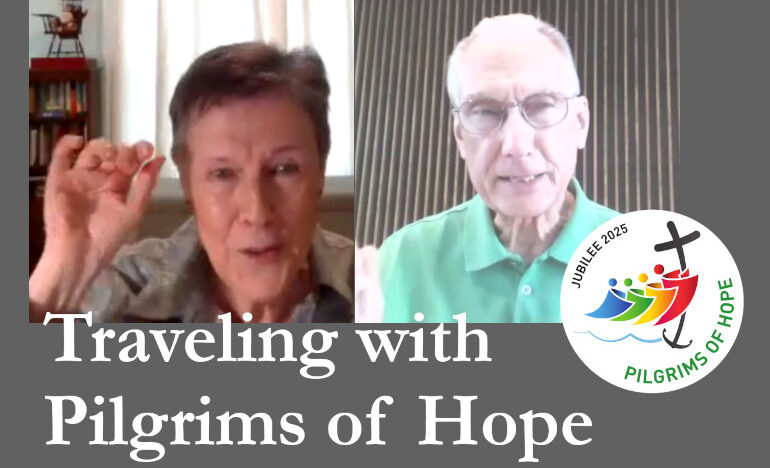How to Catch a Monkey or Learning to Let Go

An Assembling God’s Puzzle video
By Fr. Garry Richmeier
I once heard someone describe how to catch a monkey in Africa. First you get a glass jar with an opening just large enough for a monkey to reach its hand into, and you tie the jar to a tree. Then you put a banana in the jar and wait for the monkey to come, reach into the jar, and grab the banana. Its hand is then in the shape of a fist, and it can’t pull its hand out of the jar with the banana. Since it won’t let go of the banana in order to remove its hand, it is stuck, and you simply walk up and throw a net over the monkey.
I’m not sure if this actually works or if anyone has tried it. Factual or not, it makes a good parable to teach a valuable lesson for us human beings. A piece of the puzzle that is part of us human beings is the desire to hang on to something and not let go, even if it causes us problems.
We have to hang on to many things that help us survive. For example, I hold onto my job so I can pay the bills. I hold onto relationships to avoid being alone. I hold onto my faith which gives meaning to my life and helps me be a good person. There are many things we would not want to let go of, nor should we, because they are integral to who we are and necessary for physical, psychological, relational, Spiritual, or moral survival.
But complications arise when we get confused about what is necessary for our survival (things to hold onto) and what isn’t necessary (things that can be let go). The monkey that can’t let go of the banana thinks that particular banana is necessary for its survival, but it really isn’t. That misconception gets the monkey captured. We often imprison ourselves by holding onto things that really aren’t that important or necessary.
For example, we want others to like us. Their positive opinion of us is like a sweet banana we think we need for survival, and we will sometimes do anything to hold onto that. Even if it means imprisoning ourselves in a life of pretending to be someone we’re not, or condemning ourselves to trying to live up to an image that is impossible to achieve. Power and control are also things we hold onto tightly, thinking that they will ensure our survival. Manipulating or threatening or shaming others, winning every argument by shouting the loudest, or building the biggest military are examples of this. Often we will not let go of even a little bit of power and control, even if it means being capture in a net of endless war and mistrust, and a life of conflictive and failed relationships.
So how do we work at letting go of things that cause us problems? First of all, we need to cultivate a realistic view of our ability to survive. There are relatively few things in life that can threaten our survival, or threaten who we are. But our fears and imagination can tell us otherwise, so we have to work to recognize reality.
At our core, we are precious creations, made in the image and likeness of God. And nothing can change or threaten that — not other people’s opinions of us, not our successes or failures, not our physical beauty or plainness, not our culture or race or gender, not our IQ, not our economic status, not the number of friends we have on social media — nothing.
The more we let the truth of who we really are sink into our hearts and minds, the less we will need to hang onto all those things we think we need to protect who we are, which often cause us problems. We are then freer to choose what to hang onto and what to let go of.
Some of our deepest fears have to do with not being in control. And holding onto control has caused some of our greatest suffering as a species. We are not easily convinced that letting go of that banana is a good thing to do.
Even Jesus has not been able to convince us of that. How often did he say things like “turn the other cheek,” “do good to those who hurt you,” “sell what you have and give to the poor,” and “the one who loses their life will save it”? We mostly agree those are nice sayings, but letting go of control in those ways doesn’t make sense to us. Our fears keep us hanging onto doing things the way we want to, but which continue to cause us problems.
Jesus also said “Fear is useless. What is needed is faith” (Mk. 5:36). And therein lies our hope. It takes a leap of faith to believe that letting go of some control will not threaten our survival, but will lead to life. We probably won’t be convinced by logical argument alone. But reflecting on our past experiences can help bolster our faith.
For example, experience tells us that a relationship will survive only if both parties sacrifice some control. It is that way in marital relationships, business relationships, and relationships between political parties. Reminding ourselves of things like that can help us decide to let go of some control in the future when needed. Of course there are no guarantees, and that is why faith is required.
The Christian faith is built on trust/belief in the Pascal Mystery — that new life comes from death (letting go). Jesus gave his life to help us take that leap of faith, because he knew that was the only way to freedom and new life.
All of the videos in this series can be found here: Assembly God’s Puzzle.
Never miss an article published on the Renewal Center website: Sign up to receive our newsletters.
[Fr. Garry Richmeier, a Precious Blood priest and spiritual director, holds a Master’s of Divinity Degree from St John’s University in Collegeville, Minnesota, and a Master’s of Counseling Psychology degree from the University of Missouri-Kansas City. He is a licensed professional counselor and a licensed marriage and family therapist.]
Illustration 27601138 © Christos Georghiou | Dreamstime.com — How to Catch a Monkey or Learning to Let Go — An Assembling God’s Puzzle video
We’d Like to Hear from You!
We’d like to know what you think about this article. Send us a comment using the form below. Do you have a suggestion? Is there something you want to learn more about? Send us a note.
Related

Pilgrims of Hope, Episode 6: Walking with Cancer Survivors
Hosted by Fr. Ron Will, C.PP.S.
We are talking with people who find hope amid difficult circumstances or bring hope to others. In this episode, Kathy Keary talks about how centering prayer, journaling and other spiritual practices helped her cope with two life threatening health issues.

The Rollercoaster Torture
An Assembling God’s Puzzle video
By Fr. Garry Richmeier, C.PP.S.
Life is full of ups and downs, like a roller coaster, and that fact is a piece of life’s puzzle that we must deal with. Depending on how we deal with it, it can be torture, or it can be simply another difficult aspect of life to be navigated. How do we avoid the torture?
Categories
Assembling God's Puzzle Coffee with Padre Cooking & Spirituality Encounters of the 4th Kind Family Matters Reflections on the Eucharsitic Prayers Spiritual Resources Taize Prayers The Contemplative Life Traveling with Pilgrims of Hope Uncategorized Videos Week of Prayer for Uhristian Unity When you need a little help
